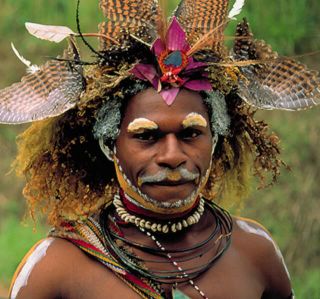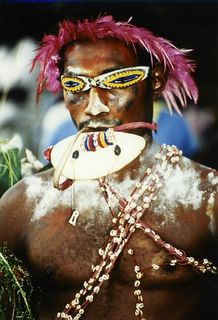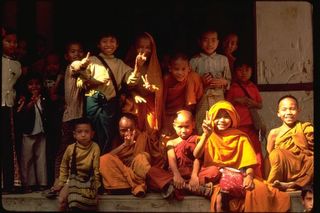 Travel Writer at WorkI'm often asked about being a guidebook writer
Travel Writer at WorkI'm often asked about being a guidebook writer
By Joshua BermanHow'd you get that job?I've always written, edited all my school papers and, after college (Environmental Studies, Brown University), I published my first couple of magazine articles and was hooked. Then, I joined the Peace Corps and was assigned to a beautiful tropical country that was just beginning to crawl out from under a particularly intense period of gritty, vibrant history.
Nicaragua still conjured up violent images of the civil war of the 1980s in most of the world's mind, but the strife had been over for years and things were, as they say,
muy tranquilo. Word was getting out in backpacker circles and beyond, and we began to notice a trickling of curious gringos poking around along the border with Costa Rica; my fellow volunteers and I more or less witnessed the birth of tourism in Nicaragua with nary a guidebook in sight.
After completing our two-and-a-half-year tours of service, my companero,
Randy Wood, and I decided to write the first, longest, and bestest-ever guide to Nicaragua. We pitched it to
Moon (after finding their book proposal guidelines online) and they bought it. A year later we were holed up in the
Pimp Tower, cranking away toward our first big deadline.
What is Moon Handbooks? Why did you choose to work for them?Moon Handbooks is one of eight guidebook series produced by
Avalon Travel Publishing (ATP). Randy and I approached
Moon because the depth and quality of their books matched our vision of what we wanted to do in
Nicaragua: use our combined six years experience living among Nicaraguans to create a thorough, in-depth guidebook with emphasis on the cultural and geographical characteristics that make this country totally unique in the region. The book was an important personal project for each of us, one that sometimes seemed an extension of our Peace Corps service. It was both an excuse to remain in Nicaragua and an opportunity to pay tribute to a country that had generously taken us in.
We wanted a publisher that would allow us to write in our own style in order to properly portray our passion for the place, even as we followed the necessary guidelines of the series.
Moon encourages its authors to do just that. After signing with them, we learned that ATP is considered to be one of the better guidebook producers to work for, granting its authors copyright to their text and royalty-based contracts.
How long does it take to write or update a guidebook?Writing the first edition of
Nicaragua took two of us six months working every day, every night, and every weekend, traveling to every corner of the country. When I updated and rewrote
Belize in 2003, I spent four straight months scouring the countrys resorts, restaurants, ridges, and reefs, writing it up as I went along, without a single day off. Randy and I once made a pact never to calculate our hourly pay.
How often do you update your books?Each one gets updated every three years. Latin America and Caribbean titles are always released in the fall, when folks are planning their winter vacations. That means a book being released in November is based on research done during the previous December and February.
Do you pay any attention to your reader mail?I read every single piece of correspondence I receive. People e-mail me either directly (josue AT stonegrooves DOT net) or through my publisher (
atpfeedback@avalonpub.com). In fact, the very first thing I do when updating a new edition is go through the accumulated mail and press releases, filing them into folders based on the chapters of the book.
Moon readers are generally a thoughtful, observant, and articulate crowd, and I always appreciate reading their observations and experiences.
How can I get my business listed in one of your books?There are no fees to be listed in any
Moon Handbook and no advertising (except for a single page in the back of the book). Inclusion is based on merit and accessibility, both of which are determined by the authors. Build the quality of your service, earn a good reputation, and I (or one of my co-authors) will eventually seek you out (Belize and Nicaragua are not large countries). If you're worried about getting mistakenly passed over (it happens), contact me at one of the e-mail addresses above and tell me where you are, what you offer, and why travelers should be told about your establishment.
What's a typical day for you? How do you spend your time?During a pre-deadline research run, I am charging around the country (usually alone), sometimes walking the streets and lurking around bus stations, and often holed up in some hotel (from every fleabag
hospedaje to $200-a-night suites), slamming local coffee and lost in my laptop. There usually isn't much (if any) time for boat tours, diving, or long hikes (I only dove once in four months in Belize!); still, when asked by tour providers to help them test out a new trail route or a product like volcano surfing, I try to oblige.
I'd break my time down like this: one third of my time is spent researching on the road. This means not only visiting as many tourism-related businesses and destinations as possible, but also making phone calls, interviewing government employees and taxi drivers, and bribing Peace Corps Volunteers with alcohol in exchange for local knowledge. The second third of my time is spent typing it all up, transferring volumes of notebook scratchings into my iBook, and then turning it all into publishable text.
The other third is spent staying organized, keeping track of hundreds of word documents, digital images, slides, hotel brochures, bus schedules, maps . . . basically, this is the part that sucks.
When you're researching, do you tell people who you are or do you travel incognito?I stay incognito when I'm in a rush or when I'm traveling in an area so new to tourism that it doesn't matter that I'm a guidebook writer. This accounts for much of my time on the road. When things slow down however, and I have time for the extended tour (or when my neglected ego needs a boost in some beachside backpacker bar), I'll show people the book I'm working on and explain my mission. Doing so not only qualms hotel owners' fears when this strange gringo storms in and begins taking photos and writing in a suspicious little notebook, it also leads to all kinds of contacts and recommendations which, when my goal is to learn as much about an area in as little time as possible, are indispensable.
Does revealing my identity occasionally lead to preferential treatment? Sometimes, yes, but since I don't write reviews,
per se, I don't see a conflict. Businesses that deserve to be in the book get in there; those that deserve a few extra glowing adjectives, they get those too. If a restaurant smells like socks and has a boring menu and horrible service, they simply don't go in the book, whether they gave me a free dogmeat enchilada or not. My co-authors and I have a longterm reputation we're trying to build, and we won't do that by misleading our readers.
Does it get lonely?There is an anonymous quote in my Outward Bound readings book: The difference between loneliness and solitude is your perception of who you are alone with and who made the choice. But yeah, sometimes, when I'm curled up and shaking in the bottom of a hammock, sweating blood out of my scalp with no one to take care of me, it can be lonely. Usually however, traveling solo is pretty cool. Adam Katz describes it well
here.
Can you make a living writing guidebooks?A handful of guidebook writers have figured out a way to do this (including Andrew Hempstead and Tom Brosnahan, link to their sites below), but not me. I'm trying to work on other types of writing and, in general, guidebook writing is too much work for too little pay. My book advances are enough to cover the expenses of my research trips, but not much more (there is no expense account, only a lump sum to do the work). In between editions, I rarely see a royalty check since all my sales are going towards making up my advances (so far anyway, I'm still kind of a rookie). I try to use my newfound expertise and book credits to sell magazine articles, but this is difficult, even for a published author, and I have never had a steady stream of income from freelancing. To make ends meet, I often take seasonal jobs like leading wilderness or service trips or fighting fires.
How can I become a travel writer?You've got to be a writer. That means you've got to write. Lots. The traveling part will happen itself as you live your life. Travel can be driving from your house to the grocery, or it can be sailing around the world. It's the writing that's important, so crack open a fresh journal and answer the call of those cool, white pages.
For the nitty gritty on the business of guidebook writing and more FAQs, check out the articles on these pages:
Andrew Hempstead and
Tom Brosnahan, or go to my
links page. You'll find more travel writer tips and profiles at Rolf Potts'
Vagabonding.
Advice from a Travel Writer

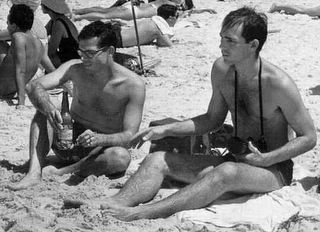
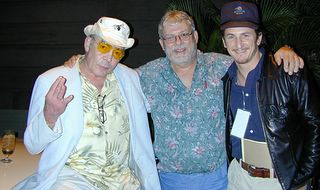
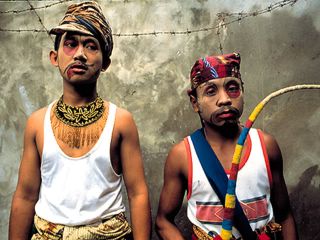
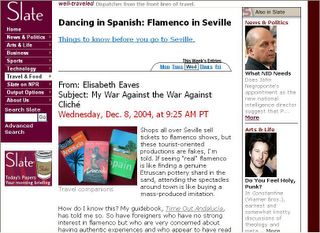
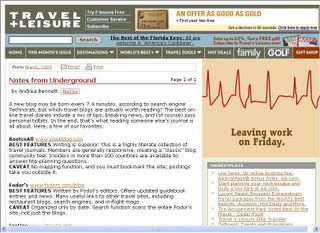

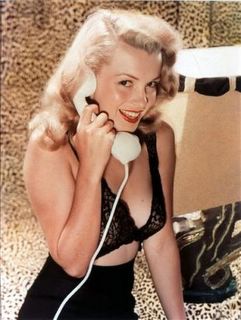
%20-%20Gadling%20-%20www%20gadling%20com%202%2012%202005%209%2036%2045%20AM.jpg)
